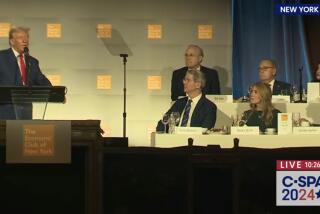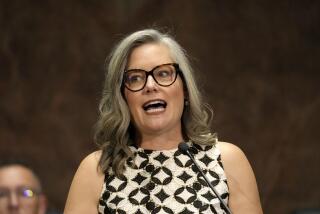Bush Vetoes Bill Granting Family Leaves : Legislation: He objects to government mandating such workplace issues. Despite criticism, an override by Congress is viewed as unlikely.
WASHINGTON — President Bush--who as a candidate stressed the need to give workers time off to care for seriously ill family members or newly arrived children--Friday vetoed a bill that would have required larger employers to provide up to 12 weeks of unpaid family leave.
“I strongly object . . . to the federal government mandating leave policies for America’s employers and work force,” the President said in a written statement issued at the White House as he began a five-day visit to his vacation home in Kennebunkport, Me.
Although the President’s action prompted an immediate storm of criticism, it appeared likely that he would be able to muster enough support to sustain his 13th veto when Congress returns from its July Fourth recess.
While stating that parental leave is an important employee benefit, Bush said: “We must ensure that federal policies do not stifle the creation of new jobs, nor result in the elimination of existing jobs.
“If our nation’s employers are to succeed in an increasingly complex and competitive global marketplace, they must have the flexibility to meet both this challenge and the needs of their employees,” Bush said, suggesting as he had during the acrimonious debate over the measure that competition for workers eventually would force employers to grant the leave.
But this “voluntary” approach puts the President in conflict with even some of his most loyal Republican supporters, who saw the measure as an opportunity to demonstrate his support for family oriented issues at a time when his anti-abortion position has come under fire.
“This is bad policy and bad politics,” said Rep. Marge Roukema (R-N.J.), one of a relatively small number of Republicans who supported the bill in the House.
Speaking privately, Democrats acknowledged that they probably lack the two-thirds majority required to override Bush’s veto. The measure passed by a vote of 237 to 187 in the House. Proponents would need to pick up at least 61 additional votes to overcome the veto. In the Senate, the bill was passed on a voice vote.
At the start of the general election campaign in 1988, Bush proposed a number of domestic initiatives, seeking to distance himself from some of the social policies of the Ronald Reagan Administration in which he served as vice president for eight years.
The bill the President vetoed would require firms with 50 or more workers, as well as state and local governments, to grant employees as much as 12 weeks of unpaid leave for specified family or medical reasons without losing any health insurance coverage during their absences. Federal employees would be entitled to longer leave periods under the bill.
Employers would be required to guarantee the jobs of workers taking the unpaid leaves. The bill would exempt companies with fewer than 50 employees, and it includes exemptions for high-paid employees.
A study by the General Accounting Office, the congressional watchdog agency, found that the measure would affect 5% of all employers, while covering 44% of the work force.
Among Democratic leaders, the veto prompted a volley of sharp criticism.
“The President should be ashamed for vetoing this bill and making a mockery of the term ‘family values,’ ” said House Majority Leader Richard A. Gephardt (D-Mo.).
Gephardt suggested that Congress might pass another version of the bill later this year, forcing Bush to repeat his veto closer to election day.
“I’m stunned by the cynicism that this veto reveals,” said Judith Lichtman, president of the Women’s Legal Defense Fund and head of a coalition of labor, church and other groups that lobbied for the bill. “President Bush doesn’t care about American families. He really only cares about big business.”
The President’s action was endorsed by the U.S. Chamber of Commerce. “The federal government has no role in dictating national employment policy,” said Christine A. Russell, the Chamber’s chief liaison officer with the House of Representatives.
And John Sloan, president of the National Federation of Independent Business, said that the measure “could have destroyed American business’ flexibility by restricting business growth, damaging productivity and reducing the number of available jobs.”
Staff writer William J. Eaton contributed to this report.
More to Read
Get the L.A. Times Politics newsletter
Deeply reported insights into legislation, politics and policy from Sacramento, Washington and beyond. In your inbox three times per week.
You may occasionally receive promotional content from the Los Angeles Times.










